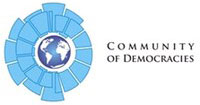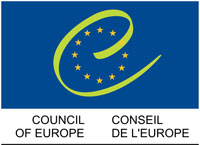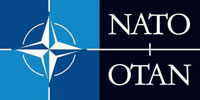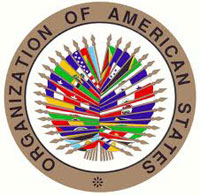Democratic Multilateral Alternatives to the United Nations
Multilateral Organizations of Primarily Democratic States
 Community of Democracies (106 states)
Community of Democracies (106 states)
List of Member States:
Community of Democracy's Vision
"...Recognizing the universality of democratic values, Hereby agree to respect and uphold the following core democratic principles and practices: ...Our goal is to support adherence to common democratic values and standards, as outlined above...We will collaborate on democracy-related issues in existing international and regional institutions, forming coalitions and caucuses to support resolutions and other international activities aimed at the promotion of democratic governance..."[From the Final Warsaw Declaration: Toward a Community of Democracies, Warsaw, Poland, June 27, 2000]
 Council of Europe (47 states)
Council of Europe (47 states)
List of Member States:
The Council of Europe, based in Strasbourg (France), now covers virtually the entire European continent, with its 47 member countries. Founded on 5 May 1949 by 10 countries, the Council of Europe seeks to develop throughout Europe common and democratic principles based on the European Convention on Human Rights and other reference texts on the protection of individuals.[Adapted from http://www.coe.int/en/web/about-us/values/]
Objectives
The Council was set up to:
Political aims
- to protect human rights, pluralist democracy and the rule of law,
- to promote awareness and encourage the development of Europe's cultural identity and diversity,
- to find common solutions to the challenges facing European society,
- to consolidate democratic stability in Europe by backing political, legislative and constitutional reform.
The current Council of Europe's political mandate was defined by the third Summit of Heads of State and Government, held in Warsaw in May 2005 and it includes the following aims: confirm and strengthen the Council's key mission to safeguard and promote human rights, democracy and the rule of law all over the continent; developed pan-European political dialogue at intergovernmental, inter-parliamentary and regional/local level; implement the reform of the European Court of Human Rights, including more efficient processing of applications as well as speeding up the decision-making process at the Court; foster Council of Europe action aimed at promoting social cohesion, intercultural dialogue and democratic citizenship; strengthen relations and co-operation with the European Union, the Organisation for Security and Co-operation in Europe and the United Nations.
The following issues came under close consideration in the context of the Summit: trafficking in human beings, terrorism, the protection of national minorities, money laundering, corruption, organised crime, violence against children, use of the Internet, free movement of Europeans across the continent, migration flows and displacement issues.
How it works
The main component parts of the Council of Europe are:
- the Committee of Ministers, composed of the 46 Foreign ministers or their Strasbourg-based deputies (ambassadors/permanent representatives), which is the Organisation's decision-making body.
- the Parliamentary Assembly, grouping 630 members (315 representatives and 315 substitutes) from the 46 national parliaments. The current President is Mevlüt ÇAVUS,OG(LU (Turkey).
- the Congress of Local and Regional Authorities, composed of a Chamber of Local Authorities and a Chamber of Regions. Its current President is Keith Whitmore (United Kingdom)
- the 1800-strong secretariat headed since October 2009 by Secretary General Thorbjørn Jagland (Norway), former Prime Minister and Minister of Foreign Affairs.
G8 (8 states)
List of Member States:
"The Group of Eight (G8) is a forum for the leaders of eight of the world's most industrialized nations, aimed at finding common ground on key topics and solutions to global issues. The G8 includes Canada, France, Germany, Italy, Japan, Russia, the United Kingdom and the United States. While the leaders of these countries are in regular contact, they meet in summit format as the G8 once a year.[Adapted from: https://www.cfr.org/backgrounder/group-eight-g8-industrialized-nations]
The G8's origin stems from meetings held in the 1970s between France's Valéry Giscard D'Estaing and Germany's Helmut Schmidt when they were finance ministers. Each subsequently assumed the leadership of their respective countries, just as the mid-1970s oil crisis was buffeting the world's largest economies. French President Giscard D'Estaing urged the leaders of Germany, Italy, Japan, the United Kingdom and the United States to meet in 1975 to discuss how to respond to the oil crisis.
Canada joined the group in 1976 at the Puerto Rico Summit hosted by the United States. The European Community, now the European Union, was given observer status the following year at the London Summit. Russia became a full-fledged member of the G8 in 1998."
 North Atlantic Treaty Organization (26 states)
North Atlantic Treaty Organization (26 states)
List of Member States:
"The North Atlantic Treaty Organisation (NATO) is an alliance of 28 countries from North America and Europe committed to fulfilling the goals of the North Atlantic Treaty signed on 4 April 1949. In accordance with the Treaty, the fundamental role of NATO is to safeguard the freedom and security of its member countries by political and military means. NATO is playing an increasingly important role in crisis management and peacekeeping."[From http://www.nato.int/cps/en/natolive/faq.htm#A1]
"NATO has an open door policy with regard to enlargement. Any European country in a position to further the principles of the Washington Treaty and contribute to security in the Euro-Atlantic area can become a member of the Alliance at the invitation of the North Atlantic Council."
"Countries aspiring for NATO membership are also expected to meet certain political, economic and military goals in order to ensure that they will become contributors to Alliance security as well as beneficiaries of it."
"NATO's Membership Action Plan (MAP) is designed to assist aspirant partner countries in their preparations by providing a framework which enables NATO to channel assistance and practical support to them on all aspects of NATO membership."
 Organization of American States (35 states)
Organization of American States (35 states)
List of Member States:
The Organization of American States (OAS) brings together the countries of the Western Hemisphere to strengthen cooperation and advance common interests. It is the region's premier forum for multilateral dialogue and concerted action.[From http://www.oas.org/documents/eng/oasinbrief.asp]
At the core of the OAS mission is an unequivocal commitment to democracy, as expressed in the Inter-American Democratic Charter: "The peoples of the Americas have a right to democracy and their governments have an obligation to promote and defend it." Building on this foundation, the OAS works to promote good governance, strengthen human rights, foster peace and security, expand trade, and address the complex problems caused by poverty, drugs and corruption. Through decisions made by its political bodies and programs carried out by its General Secretariat, the OAS promotes greater inter-American cooperation and understanding.
The OAS member states have intensified their cooperation since the end of the Cold War, taking on new and important challenges. In 1994 the region's 34 democratically elected presidents and prime ministers met in Miami for the First Summit of the Americas, where they established broad political, economic and social development goals. They have continued to meet periodically since then to examine common interests and priorities. Through the ongoing Summits of the Americas process, the region's leaders have entrusted the OAS with a growing number of responsibilities to help advance the countries' shared vision.
 Organization for Security and Cooperation in Europe (57 states)
Organization for Security and Cooperation in Europe (57 states)
List of member states:
"OSCE promotes democracy and assists the participating States in building democratic institutions." [From http://www.osce.org/what]
"The OSCE has a comprehensive approach to security that encompasses politico-military, economic and environmental, and human aspects. It therefore addresses a wide range of security-related concerns, including arms control, confidence- and security-building measures, human rights, national minorities, democratization, policing strategies, counter-terrorism and economic and environmental activities. All 57 participating States enjoy equal status, and decisions are taken by consensus on a politically, but not legally binding basis."[From http://www.osce.org/who]
Documents: Charter of Paris for a New Europe, 1990, http://www.osce.org/mc/39516Note Concerning the African Union (55 states)
Eight of the fifty-four UN members of the African Union are fully-free, according to Freedom House (marked with an *): Algeria, Angola, Benin, Botswana*, Burkina Faso, Burundi, Cameroon, Cape Verde*, Central African Republic [currently suspended], Chad, Comoros, Democratic Republic of the Congo, Republic of Congo, Cote d'Ivoire, Djibouti, Egypt, Equatorial Guinea, Eritrea, Ethiopia, Gabon, Gambia, Ghana*, Guinea, Guinea-Bissau, Kenya, Lesotho, Liberia, Libya, Madagascar, Malawi, Mali, Mauritania, Mauritius*, Morocco, Mozambique, Namibia*, Niger, Nigeria, Rwanda, Sahrawi Republic, Sao Tome and Principe*, Senegal, Seychelles, Sierra Leone, Somalia, South Africa*, South Sudan, Sudan, Swaziland, Tanzania, Togo, Tunisia*, Uganda, Zambia, Zimbabwe.
